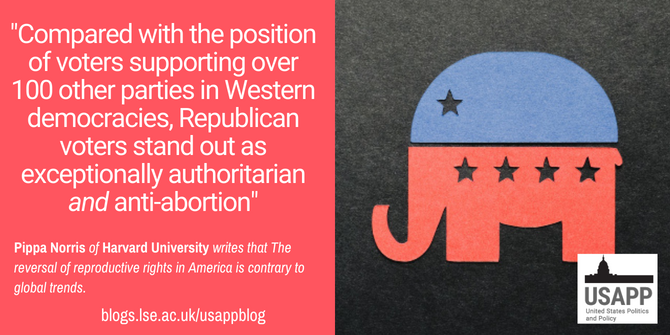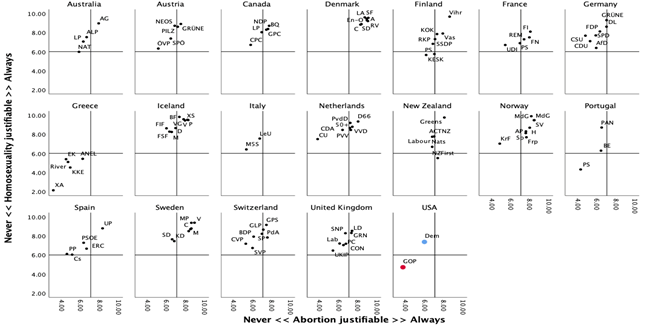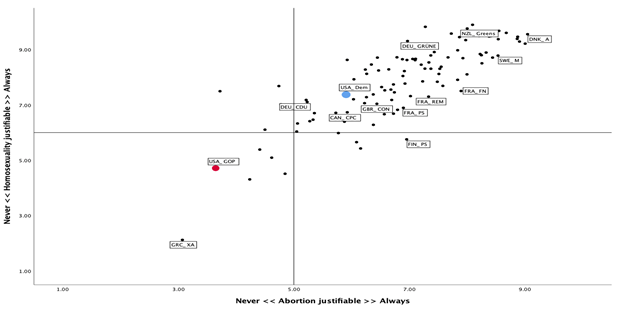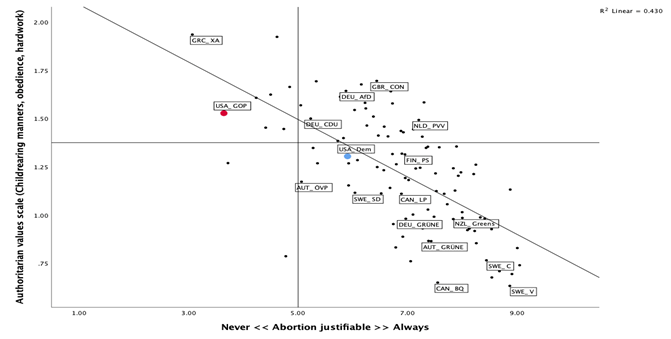 Last week’s decision to overturn Roe v Wade, ending the right to an abortion in the US, allowed many Red states to adopt some of the most restrictive abortion laws in the world. Using new survey data, Pippa Norris looks at the extent to which these policies can be explained by the strategies of Republican lawmakers or by the values and beliefs of their party’s grassroots supporters. She finds that most Americans support the right to obtain a legal abortion. Compared to voters across almost all other Western democracies, however, Republican supporters prove exceptionally socially conservative, anti-abortion, and authoritarian in their values.
Last week’s decision to overturn Roe v Wade, ending the right to an abortion in the US, allowed many Red states to adopt some of the most restrictive abortion laws in the world. Using new survey data, Pippa Norris looks at the extent to which these policies can be explained by the strategies of Republican lawmakers or by the values and beliefs of their party’s grassroots supporters. She finds that most Americans support the right to obtain a legal abortion. Compared to voters across almost all other Western democracies, however, Republican supporters prove exceptionally socially conservative, anti-abortion, and authoritarian in their values.
The past half century has seen growing liberalization of access to legal abortions worldwide. Global estimates report that abortion to save a woman’s life is allowed by law in 98 percent of countries. Post-industrial societies are usually least restrictive in allowing abortion on request, with different gestation periods.
By contrast, Republican-controlled states in the US are reversing this global trend by implementing criminal bans on legal access to all abortions. They join just two dozen countries around the world with similar draconian restrictions, such as Mauritania, Madagascar, Egypt, Iraq and Honduras. In adopting these policies, Texas, Oklahoma, and Alabama are now more restrictive of reproductive rights than deeply religious societies like Saudi Arabia, Iran, and Afghanistan. Indeed, some US states go further than medieval England; the first references to abortion in English law appeared in the 13th Century. The law followed Church teaching that abortion was acceptable until ‘quickening’, which, it was believed, was when the soul entered the fetus. The legal situation remained like this for centuries and the tradition was transferred to the American colonies. Historical records suggest that abortion prior to ‘quickening’ was an accepted practice by skilled midwives which only started to be criminalized in 1821 by a Connecticut law which sought to punish those providing abortion-inducing medicine.
Why the sudden rollback of reproductive rights in America two centuries later?
But why are many American states reversing track on reproductive rights, contrary to global trends towards greater liberalization? Obviously, it’s a complex story.
Party strategies and conservative leaders?
Many popular narratives focus on specific contingent events, party strategies, and leaders in the conservative movement responsible for tipping the balance in the court and state houses: most obviously, President Obama’s failure to prioritize codifying reproductive rights into federal law when Democrats had opportunities to do so; Congressional gridlock and the then Senate Majority Leader, Mitch McConnell’s hard-ball strategy blocking debate about Obama’s nomination of Merrick Garland to the United States Supreme Court; the death of Ruth Bader Ginsburg allowing President Trump’s nomination to tip the balance in the Supreme Court; the role of dark money, partisan polarization and evangelical zeal fueling culture wars; and a broken judicial nomination process dominated by political theatre.
Structural arrangements systematically over-represent rural areas (and thus Republican social conservatives) in the Senate and Electoral College, while processes of partisan gerrymandering, primary elections, and partisan control of state electoral laws incentivizes candidates in both parties to run for elected office by appealing mainly to their ideological party base more than the median voter. Dobbs v. Jackson can be understood as the logical outcome of these constitutional flaws and dysfunctional inducements.
Or the values of the Republican base?
All these contingencies and structural failures are likely contributors to the eventual reversal of Roe v Wade, along with many others. BUT the GOP position on abortion is out of touch with American public opinion. Since 1972, the annual series of General Social Surveys have monitored abortion opinions by approval in a series of six conditions. The results have been relatively stable since Roe v Wade, suggesting that most Americans consistently approve of the availability of legal abortions under certain circumstances. The proportion of Americans in GSS surveys agreeing that it should be possible for a pregnant woman to obtain a legal abortion rose from around 40 percent in 2000 to 55 percent in 2021. Similarly Gallup reports that the majority of Americans (55 percent) see themselves today as pro-choice, with numbers rising recently. Early polls also indicate majority disapproval of the Court’s actions in abolishing apportion rights.
Yet Republican lawmakers (and, by extension, GOP-appointed conservative justices) do reflect the beliefs and values of their party’s grassroots supporters.
As I explain in my 2019 book with Ronald Inglehart, Cultural Backlash, the restriction on legal access to abortion is part of a broader cultural backlash by the socially conservative minority whose hegemonic status and power was threatened by the rising tide of social liberalism (the ‘silent revolution’) which started in the 1960s and 1970s.
To explore this issue, the latest wave of the European Values Survey/World Values Survey (2017-2021) monitors representative samples of over 135,000 respondents living in 83 societies worldwide. Attitudes towards abortion are monitored using a 10-point scale, from ‘never justified’ (1) to ‘always justified (10), along with a wide range of social and political values, as well as partisan voting preferences.
Survey evidence suggests three striking findings.
(1) Due to religiosity, America is far more socially conservative towards abortion than similar nations
Figure 1 – Attitudes towards abortion and religiosity, worldwide

Q: “Please tell me for each of the following actions whether you think it can always be justified, never be justified, or something in between, using this card. Abortion. 1= ‘Never’ 10=’Always’. Source: World Values Survey/European Values Survey Wave 7 (2017-2021) www.worldvaluessurvey.org
At national level, pro-abortion attitudes are predicted by several societal characteristics, including levels of economic development and liberal democracy, which should mean that America is relatively liberal compared with other societies worldwide. But attitudes are even more strongly associated with the strength of religiosity and as shown in Figure 1, it is this which makes America far more socially conservative towards abortion than most other similar affluent post-industrial societies and liberal democracies like Sweden, France, Australia, and the UK. While secularization has been rising in the United States, a substantial body of evidence presented elsewhere demonstrates that religious values and behaviors have declined further and faster in many other comparable Protestant and Catholic developed societies.

Photo by Kelly Sikkema on Unsplash
(2) Among Western democracies, Republican voters are among the most conservative in their views on abortion and homosexuality
To drill down further however, and to see whether there are identifiable systematic patterns which defy contingent elite-level explanations, we need to examine party polarization in socially liberal and conservative attitudes among voters. In this regard we can focus on comparing public opinion among supporters of 115 political parties in a range of 19 equivalent Western liberal democracies and affluent post-industrial societies. Attitudes towards abortion can also be compared with approval of homosexuality, as a closely related benchmark of moral values. As illustrated in Figures 2 and 3, the results of the comparison suggest that the position of voters in the Republican Party is one of the most conservative on these issues compared with party voters across almost all other Western democracies, except for Greece, where the Orthodox church has long been vigorously opposed to reproductive rights. By contrast, party voters in the Democratic Party, far from being extremely liberal, as sometimes claimed, are in fact mainstream on these issues when compared with most parties in Western democracies, including both left-wing and conservative parties.
Figure 2 – Attitudes towards abortion and homosexuality by party vote in 19 Western democracies

Q: “Please tell me for each of the following actions whether you think it can always be justified, never be justified, or something in between, using this card. Abortion. 1= ‘Never’ 10=’Always’ . N. 24,536 Source: World Values Survey/European Values Survey Wave 7 (2017-2021) www.worldvaluessurvey.org
Figure 3 – Republican moral attitudes are far more socially conservative than parties in most Western democracies
Q: “Please tell me for each of the following actions whether you think it can always be justified, never be justified, or something in between, using this card. Abortion. 1= ‘Never’ 10=’Always’ . N. 24,536 Source: World Values Survey/European Values Survey Wave 7 (2017-2021) www.worldvaluessurvey.org
(3) Republican voters are also exceptionally authoritarian

Finally, as well as religiosity, voter’s attitudes towards abortion are also closely associated with authoritarian values. This orientation can be measured in several ways but one of the most standard approaches in social psychology has been to examine ‘childrearing preferences’, a simple scale measured by the importance of inculcating the values of ‘good manners’, ‘obedience’, and ‘hard work’ in children. These values have long been seen as at the heart of the ‘authoritarian personality’ or the ‘authoritarian reflex’, emphasizing tradition and conformity without referring directly to attitudes towards specific moral beliefs and sexual orientations – or indeed support for strong-man leaders and authoritarian regimes. Support for authoritarian values can be measured by summing up responses towards these childrearing values.
Most strikingly, once we do so, the results in Figure 4 show that a predictable pattern can be observed; in general party attitudes towards abortion are strongly correlated with this scale of authoritarian childrearing values – and compared with the position of voters supporting over 100 other parties in Western democracies, Republican voters stand out as exceptionally authoritarian and anti-abortion.
Figure 4 – Abortion attitudes and authoritarian values

Q: “Please tell me for each of the following actions whether you think it can always be justified, never be justified, or something in between, using this card. Abortion. 1= ‘Never’ 10=’Always’ . N. 24,536 Source: World Values Survey/European Values Survey Wave 7 (2017-2021) www.worldvaluessurvey.org
A conservative backlash to America’s cultural changes
As argued in Cultural Backlash, older generations of traditional social conservatives feel threatened by the socially liberal arc of history evident in modern societies and the gradual transformation of attitudes and values, particularly among younger generations, exemplified by declining respect for traditional norms concerning marriage and the family, the erosion of religiosity and faith, acceptance of more fluid roles for women and men, gender identities, and forms of sexual expression, and support for the values of racial equality and ethnic diversity. In this regard, modern societies have been experiencing generational shifts in the deep tectonic plates of cultural values and social identities.
The Republican backlash against reproductive rights has clearly been mobilized by the actions of faith-based social movements, the GOP party leadership in Congress and state legislatures, and the partisan imbalance of Supreme Court justices. It has been greatly facilitated by structural and geographic biases in institutions like the Senate and Electoral College which systematically overrepresent the power of the conservative minority living in rural America, and by Republican control of state houses in the South and Midwest. But it can also be understood as a backlash rooted in how socially conservative Republican voters in the electorate respond to profound cultural changes in America. And, newly energized by victory and power, many fear that these radical forces are unlikely to stop at abolishing Roe v Wade.
Please read our comments policy before commenting.
Note: This article gives the views of the author, and not the position of USAPP– American Politics and Policy, nor of the London School of Economics.
Shortened URL for this post: https://bit.ly/3nxWXjC
About the author
 Pippa Norris – Harvard University
Pippa Norris – Harvard University
Pippa Norris is a comparative political scientist and prolific author who has taught at Harvard University for more than three decades. She tweets at @PippaN15.







Like so many other people, you do not seem to be aware of what Roe vs Wade truly was about. It did not legalize abortion, or ‘Reproductive Rights’ as you choose to coin it. It took the decision regarding its legality away from the states and put it into the hands of the Federal Government. Reversing the decision, did not make it illegal. It put the decision to make it legal or illegal back into the hands of the states. Yes, this does mean it will be illegal is some states, but not in all. This is how the United States was designed to operate. A limited Federal government, with more power embodied in the states to represent themselves. While the Federal government has been largely successful in reducing the power of the states and the people, this is one area where they have yielded back.
On another note, it would probably be good to evaluate the values of individual states in the United States rather than the United States as a whole as that would more accurately reflect the diversity contained therein.